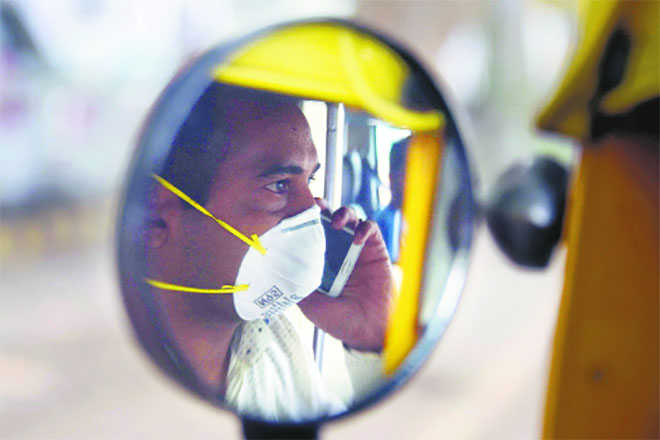
Paddy straw burning has become a permanent phenomenon in northern states of Punjab, Haryana and Uttar Pradesh. Last year, it created havoc as smoke from the fields on fire not only engulfed these states, but also choked the Capital. Ostensibly, the administration must have realised that the coercion to mitigate this plight would not work. The Centre, therefore, adopted the policy of persuasion and allotted Rs 1,151 crore to address this problem in Punjab. While the fund is allocated to purchase 14,000 machines to manage the straw in the fields, only about 500 machines could be procured.
Farmers are not burning straw deliberately to cause troubles for people. They are in a hurry to harvest paddy so they can sow the subsequent crop of wheat in time. They have to resort to burning to clear the field prior to preparing the seed bed for the next crop. They cannot wait long to let the straw be absorbed in the field. Therefore, stubble burning took place last year, despite 40,000 complaints against the practice. Taking penal action against the farmers was difficult without proof because fields are often conjunct and, therefore, it is difficult for authorities to prove the fault of a particular individual.
According to agricultural experts, it involves about Rs 1,500 to Rs 2,000 per acre to clear the field through means other than burning. Such means also involve the cost of diesel, apart from crucial time lost. Farmer cannot lose precious time in clearing the paddy field because the subsequent crop of wheat is remunerative and a major food item for northern India, particularly Punjab.
Paddy cultivation is remunerative, but it has serious environmental repercussions. In 2016 the total area under paddy was about 2.8 million hectare that increased to 3 million hectare in 2017. It is interesting that this year, when the hike of Rs 250 per quintal in the minimum support price (MSP) of paddy was announced, the transplantation of paddy was almost complete. The growing area of paddy is a concern due to the fast depletion of underground water table. As 60 per cent of the irrigation water is obtained from underground, the water level has depleted much throughout the state. Among the 147 blocks of the state, the water level in 100 has gone alarmingly low. But, it is not possible to force farmers to stop growing paddy and shift to alternative crops. Only assured procurement with higher MSP can make alternative crops equally beneficial for farmers. It can prompt them to shift to other crops.
The farmer is more interested in assured market that is provided in case of only wheat and paddy through government-assured procurement. That is why farmers do not bother to wait for the announcement of the MSPs for wheat and paddy. In Punjab the cropping pattern has turned towards wheat and paddy, where these two crops are covering about 70 per cent area of the state.
Government agencies and experts propound crop diversification. Higher MSPs are announced for alternative crops every year. But, the situation remains invariable due to the lack of assured government procurement of other crops. There would be no problem on the front of country's food security even if the area under paddy is reduced to half, but the reduction in area must not be forced on the farmer.
Looking at the invariable cropping pattern and the emerging problem of straw burning, the issue needs to be addressed socially with the patronage of the government. Looking on the attributes of paddy straw for its value addition in the form of cardboard, paper, cattle feed, bio-fuel etc., it is prudent to encourage the installation of small units to prevent straw burning. It can't be expected that the farmer would install his industrial unit irrespective of the size of the farm. Few big industrial units can't be a workable idea as it involves high transportation cost, since the straw is spread in the entirety of the area. It is estimated that about 20 million tonne of straw is produced every year that can be put to use.
The paradigm of dairy is the most appropriate alternative. Dairy cooperatives have contributed a lot to the Punjab economy. It is only Punjab where dairy is contributing about 9 per cent in the state gross domestic product, in which the role of dairy cooperatives is laudable. As small-scale units are more suitable for such industrial units, they should be installed in all the blocks of the state where farmers of the area should be made shareholders. Though the farmers would be getting a small price for their straw, with the value addition they would avail the bonus on the pattern of dairy on the basis of the share they had contributed in the cooperative venture. The straw, which was a big problem, would be turned into useful products in different shapes. At the same time, it would generate income and employment. As the infrastructure in the form of electricity, roads, banks and workshops are now available everywhere, and there is no dearth of raw materials, such small-scale production units would run successfully.
— The writer is a Senior Fellow of Institute of Social Sciences, New Delhi
Uses of crop residue
Bedding material for animals, livestock feed, soil mulching, bio-gas generation, bio-manure/compost, thatching for rural homes, mushroom cultivation, biomass energy production, fuel for domestic and industrial use
Why these are burnt on farm
- To clean the field for sowing next crop
- High cost of removing stubble from field
- Mechanised harvesting of crops
- Shortage of human labour



























